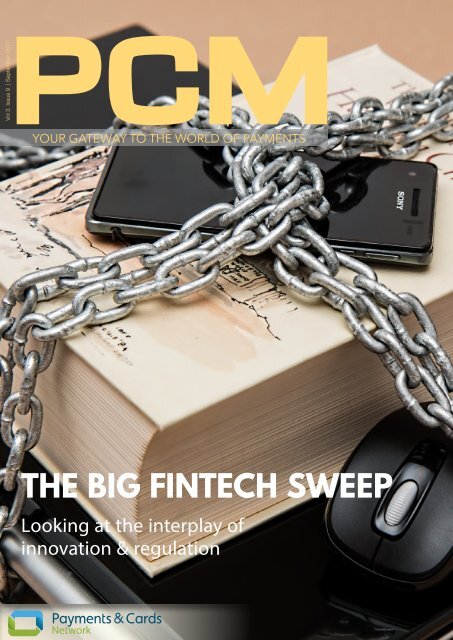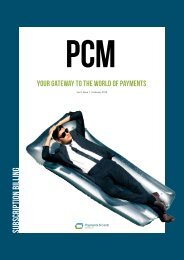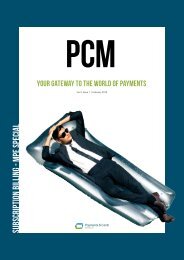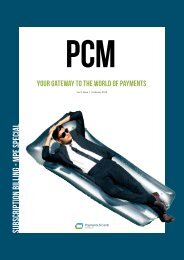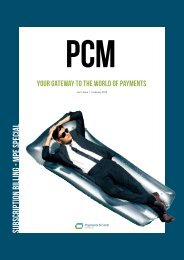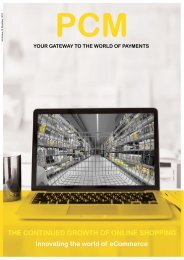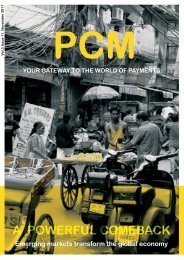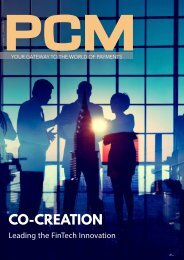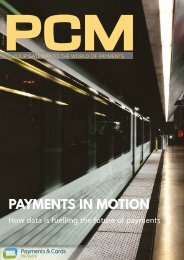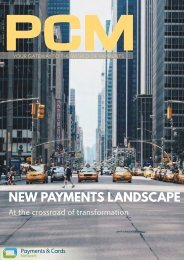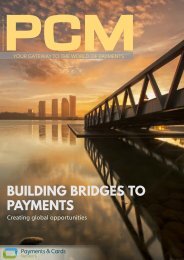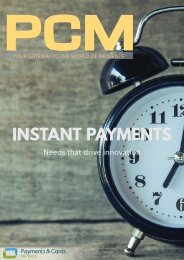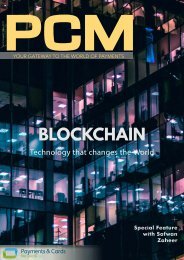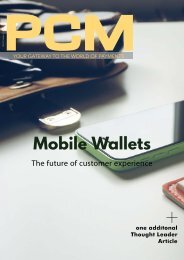PCM vol. 3 Issue 9
The September issue is focused on Regulations and Compliance with a great emphasis on PSD2. Payments and FinTech point of views from Retailers and Payment Service Providers.
The September issue is focused on Regulations and Compliance with a great emphasis on PSD2. Payments and FinTech point of views from Retailers and Payment Service Providers.
Create successful ePaper yourself
Turn your PDF publications into a flip-book with our unique Google optimized e-Paper software.
Vol 3. <strong>Issue</strong> 9 | September 2017<br />
YOUR GATEWAY TO THE WORLD OF PAYMENTS<br />
THE BIG FINTECH SWEEP<br />
Looking at the interplay of<br />
innovation & regulation
ACADEMY<br />
EXPAND YOUR<br />
FINTECH KNOWLEDGE<br />
FOR A BETTER UNDSTANDING OF THE FINTECH WORLD<br />
SIGN UP NOW<br />
academy.teampcn.comwww.payment.jobs
Contents<br />
STORIES<br />
4<br />
PSD2, from a retailer’s standpoint<br />
7<br />
10<br />
13<br />
There’s never been a better time for payment vendors<br />
to up their partnership with retailers<br />
Raise the bar<br />
Accelerating Digital Disruption: an Interview<br />
with Gregory Cronie<br />
17<br />
20<br />
24<br />
26<br />
29<br />
32<br />
33<br />
Start-up Spotlight: Cheddar Up<br />
PSD2: Challenges & Opportunities from a<br />
Merchant PoV<br />
Why is PSD2 exciting for you?<br />
A Winning Transformation<br />
Can we bridge the Atlantic?<br />
Hot Jobs<br />
Industry Events Calendar<br />
Amir Abdin<br />
Founder & Editor-in-Chief<br />
amir@teampcn.com<br />
https://nl.linkedin.com/in/amir-abdin-21365683<br />
Duc Dang<br />
Production Editor & Head of Creative<br />
THANKS TO OUR PARTNERS<br />
duc@teampcn.com<br />
https://nl.linkedin.com/in/ducdanghh<br />
<strong>PCM</strong> is designed by Duc Dang, Payments & Cards Network. Art and<br />
photos © Payments & Cards Network, picjumbo.com, Flickr.com and<br />
Shutterstock.com, excluding advertisments and company logos.<br />
<strong>PCM</strong> is property of Payments & Cards Network, Herengracht 576,<br />
2nd Fl., 1017 CJ, Amsterdam, The Netherlands. All material contained<br />
within <strong>PCM</strong> is the property of Payments & Cards Network. All other<br />
product and service names may be trademarks of their respective<br />
companies. ©2017 Payments & Cards Network. All rights reserved.<br />
Reproduction of any kind is strictly prohibited without express prior<br />
written consent of Payments & Cards Network.<br />
ADVERTISING INFORMATION<br />
For details, please contact amir@teampcn.com<br />
3
THOUGHT LEADERS CORNER<br />
PSD2, from a retailer’s standpoint by<br />
Market Pay (Carrefour Group)<br />
by Frédéric Mazurier<br />
We are seeing a very strong trend where payment<br />
is concerned: a digital re<strong>vol</strong>ution, increasingly<br />
dominant security aspects, regulatory changes,<br />
and new purchasing behaviour all of which are<br />
driving innovation in payment solutions (technical and service<br />
innovations, etc.) to make this switch less painful, smoother<br />
and more secure.<br />
We are dealing with an ecosystem that is hard to understand,<br />
a market that is no longer the preserve of banks, one that has<br />
fragmented between a large number of players offering more<br />
or less comprehensive solutions, a complex and moving system<br />
where there are considerable economic, security, regulatory,<br />
and technical challenges, without including international<br />
disparities and retailers’ requirements, which vary depending<br />
on business activity, location, size of network, and type of<br />
customer.<br />
With major challenges for companies: absolute security, the<br />
need for new payment solutions with systematic research on<br />
cost optimisation, the obligation to adapt to new purchasing<br />
behaviour (consumers are increasingly sensitive to innovation<br />
and increasingly used to getting everything for free, etc.), a<br />
need to increasingly generate greater preference and loyalty<br />
(in services, the shopping experience, etc.).<br />
The impact of the revision of the Payment Service Directive<br />
(PSD2) on the European ecosystem is therefore significant.<br />
This new directive will encourage competition and innovation<br />
by creating new prospects for non-banking operators, with the<br />
continuing aim of improving customer experience.<br />
“<br />
Payment will become the strategic point of interaction for value<br />
creation and driving the customer relationship<br />
“<br />
From harmonization to innovation<br />
PSD2 takes account of these technical developments and new<br />
practices that have appeared in the payments market since the<br />
adoption of PSD1 in 2007, and defines certain rules regarding<br />
new intermediaries in the payments market namely Third-<br />
Party Providers, the importance of whom has increased rapidly<br />
over the past few years, and who are profoundly changing<br />
payment codes.. The boom in payment service providers (PSP)<br />
and bank data aggregators, and in new payment practices<br />
(mobile) or payment methods (contactless, instant payment)<br />
will change the payment service sector.<br />
“PSD2 goes beyond harmonisation; it promotes<br />
innovation in all payment services. Mass-market<br />
retailing knows how it will take up its place in<br />
this new ecosystem.“<br />
But Open Banking and APIs have no value in themselves. These<br />
are quasi amenities made compulsory by the regulations and<br />
by technological innovation. The challenge is not the technical<br />
connection, but the ability to imagine and market on a large<br />
scale new and useful marketing services for customers.<br />
4
THOUGHT LEADERS CORNER<br />
Frédéric Mazurier<br />
CEO, Market Pay (Carrefour Group)<br />
Frédéric’s career has been focused on the Financial Services, oriented merchant<br />
and client vision, with an emphasis on building value through strategic products<br />
development. He was heading the business development for Carrefour Banque<br />
and bringing the innovation on the Carrefour payments world with the launch of<br />
the first Mastercard Only and Contactless card on the French (2009) and Spanish<br />
(2013) markets. He created and coordinated the issuing paneuropean payment<br />
platform currently extended to acceptance and acquiring.<br />
As CEO of Market Pay, from January 2016, he is driving one of the most important<br />
European payment institution.<br />
Customer relationship at the heart of the future success<br />
of PSD2<br />
Payment is an engaging and powerful interaction point<br />
between the company and its customer. A ‘transaction’ may<br />
enhance, or on the contrary undo the ‘customer relationship’.<br />
PSD2 gives power to the customer, and requires us to work<br />
on the best possible payment solutions, which boost the<br />
company’s performance and its relationship with the endcustomer.<br />
Payment will no longer be an isolated act: we<br />
need to look at the purchasing experience as a whole, in a<br />
personalised way, and create cross-channel solutions that<br />
allow you to interact with your customer before, during, and<br />
after the payment transaction.<br />
This means that customer knowledge is crucial, and that<br />
retailing is no longer only about products on shelves. With 55<br />
million loyalty cards, 6.5 million credit cards, and 13 million<br />
daily transactions at Carrefour, Market Pay must explore new<br />
territories, imagine new experiences, and adjust to, and meet<br />
the new challenges and requirements of Carrefour customers.<br />
Market Pay must draw up and implement the best payment<br />
solutions, designed according to market standards and enable<br />
the Carrefour retailer and the Carrefour Banque to turn this<br />
interaction point into a genuine opportunity for enhancing<br />
the customer experience.<br />
Maximum data security<br />
Security aspects must not be neglected, as payment security<br />
and data protection are important issues, especially where<br />
customers’ trust and fraud prevention are concerned given<br />
that the use of new technologies multiplies the number of risk<br />
scenarios, e.g. identity theft, the risk of malicious behaviour,<br />
and information leaks. Strong authentication or two factor<br />
authentication is a major measure in PSD2; on the other<br />
hand a compromise must be found between authentication<br />
measures and a simple and smooth customer transaction path<br />
because the customer experience must not suffer as a result.<br />
Furthermore, we must not underestimate the link between<br />
PSD2 and the GDPR, both of which are pushing companies<br />
further still in their obligation to assess and handle risks<br />
relating to the processing of personal data. As is the case for<br />
PSD2, the regulation on personal data puts the individual back<br />
at the centre of decisions, raises their awareness, gives them<br />
control over the use of data that concerns them, and allows<br />
them to benefit from the use of their data. All in all, a great<br />
challenge to meet, which could well be the key vital to winning<br />
our customers’ trust.<br />
Nevertheless it will be a while before this new trend is<br />
accepted<br />
PSD2 will make it easier to create innovative and valuable<br />
customer experiences by pooling the collective knowledge<br />
of banks and retailers. However, in order to respond to the<br />
impetus given by the European regulations, certain technical,<br />
operational and business elements have to be clarified/<br />
constructed:<br />
• Create a common solution at a European level. A marketled<br />
standardization effort is required to supplement the<br />
legal framework provided by the PSD2 and the EBA RTS.<br />
• Guarantee access for a minimum cost to the APIs (if<br />
not, there will not be market developments, marketing<br />
innovations, and new players)<br />
• Educate clients (pedagogy on the new services)<br />
• Create a big data economic model<br />
• Protect the confidentiality and integrity of data (data<br />
security will be at the heart of our concerns - when it<br />
comes to transmitting banking information, it is crucial<br />
to keep a close eye on security issues).<br />
In the months between now and the entry into force of PSD2,<br />
there is likely to be a lot of twists and turns in the transposition<br />
of the directive at national level and the interpretations that<br />
will be made.<br />
Market Pay<br />
Created to support the brands of the Carrefour<br />
Group, Market Pay develops and operates<br />
custom solutions to boost the business<br />
and improve the customer relations. The<br />
payment institution, which is a wholly-owned<br />
subsidiary of Carrefour Group, combines all of<br />
Carrefour’s electronic payment systems, such<br />
as Carrefour cards, POS terminals and online<br />
payment solutions, and centralises payment<br />
acceptance and acquisition services for all of<br />
the retail channels.<br />
Market Pay enables the set-up and management<br />
of customised, secure, high-performance<br />
payment solutions. It will improve the security<br />
of payment data collected from customers of<br />
Carrefour banners and develop new payment<br />
solutions for the Group.<br />
5
MAXIMIZE<br />
YOUR DATA<br />
VALUE<br />
THE LEADING SOURCE FOR DATA SCIENTISTS IN PAYMENTS<br />
CONTACT US NOW<br />
Having data dilemmas? Please contact: simon@digitalsource.io<br />
Digital Source | Herengracht 576 | 1017 CJ | Amsterdam | The Netherlands | +31 (0) 202 373 639
THOUGHT LEADERS CORNER<br />
RetailNOW Reflections:<br />
There’s never been a better time for payment<br />
vendors to up their partnership with retailers<br />
by Georgina Nelson<br />
This year’s RetailNOW event may have taken place<br />
in Las Vegas, but the theme seemed to be centered<br />
more around finding sure fire bets than uncertain<br />
gambles. Organized by the Retail Solutions Providers<br />
Association (RSPA), there were some compelling speeches,<br />
debates and conversations, and I found very similar questions<br />
emerging throughout. Where does the future of retail lie?<br />
What are the challenges retailers are facing? And what are<br />
the innovations that can help retailers turn these challenges<br />
into opportunities?<br />
A major theme to emerge from the event was that of how, in<br />
the payment technology landscape, the key to attracting and<br />
retaining customers is differentiation. As keynote speaker Bill<br />
Garcia said: “There’s a misconception in the world that price<br />
is all that matters. Don’t chase to the bottom. Differentiate to<br />
add value.” A panel discussion on the topic of “Value-Added<br />
Solutions – The Key to Customer Retention” further highlighted<br />
the importance of diversifying product offering, particularly<br />
in today’s market of relatively inexpensive POS systems, and<br />
looked at how those value adds can impact a provider’s bottom<br />
line.<br />
So what value adds can the payments industry offer to the<br />
retailer that can really make a difference?<br />
One of the biggest challenges – and opportunities – retailers<br />
are dealing with today is that of understanding the customer<br />
experience, and building on that understanding to develop<br />
all areas of their business – stores, ecommerce, product lines,<br />
marketing campaigns. As Christy Thompson of ScanSource<br />
said in her digital marketing breakout at RetailNOW: “The<br />
days of Don Draper advertising are over. The campaign was<br />
king and built on gut instinct, not data. You need to validate<br />
why your customers engage with you. Then you can build your<br />
communication strategy.”<br />
While in the past, retailers have turned to marketers to help<br />
them assess and inform customer experience strategies,<br />
payment providers now also have a stake in this game. In<br />
fact, the payment industry is uniquely positioned to build<br />
its partnership with merchants by enabling access to some<br />
of those technologies – particularly when it comes to data<br />
collection.<br />
Traditional methods for collecting customer experience data –<br />
receipt surveys, for instance – tend to yield a very low response<br />
rate, which makes it problematic to use the data collected in<br />
order to develop actionable insights. Without the data to tell<br />
them what their customers think, how can companies make<br />
informed decisions – from high level strategic decisions to<br />
something as simple as “should we change the chairs in the<br />
restaurant?”<br />
7
THOUGHT LEADERS CORNER<br />
Georgina Nelson<br />
Founder & CEO of TruRating<br />
Georgina began her career as a leveraged finance lawyer at Clifford<br />
Chance. Georgina then joined Europe’s largest consumers’ association,<br />
Which? where she was responsible for advising the EU and the UK<br />
government on their technology strategy, as well as advising internal<br />
teams on their online propositions. It was in this role where she<br />
identified a market need for mass, representative, reliable consumer<br />
ratings. She saw how this need could not only serve to improve the<br />
world of business but also be valuable to consumers alike. With this<br />
vision, she set about realizing the huge potential of TruRating by<br />
bringing together a wonderful team, exciting customers and partners<br />
in the payments industry with the ultimate objective to bring the truth<br />
back to ratings.<br />
This is where TruRating can help. It gives merchants the<br />
opportunity to ask a single question at the point of payment,<br />
and the ease and simplicity of this method of data collection<br />
means they are seeing response rates of up to 88%. This level<br />
of data, which is available in real-time and, crucially, links<br />
sentiment to spend, is providing retailers access to insights<br />
that have never before been available.<br />
We’ve achieved over five million ratings for our customers,<br />
and in doing so have learned a great deal about how gathering<br />
customer data can be used to drive changes within the business.<br />
Changes that make customers happier, and it may sound<br />
obvious but it bears emphasizing: happier customers spend<br />
more. Our data shows that retail customers who are impressed<br />
by their overall in-store experience spend a whopping 43%<br />
more on average that those who are disappointed.<br />
In a more specific example of how this data can be used to make<br />
positive changes, one of our clients asked their customers to<br />
rate their product range. In response to their findings, they<br />
changed not the range itself but simply the way that the range<br />
was displayed, with new promotional displays and a change<br />
in layout. This resulted in happy customers spending 12%<br />
more – a fantastic return on a very simple and inexpensive<br />
investment.<br />
Success stories like the above are one of TruRating’s biggest<br />
goals – to equip our customers with the means to improve, by<br />
empowering their customers to speak to them using the POS.<br />
Our win at the RetailNOW ‘Shark Tank’ challenge is perhaps<br />
reflective of the industry’s interest in technologies that enable<br />
them to provide the experience that answers – and exceeds -<br />
their customers’ expectations.<br />
Outgoing RSPA Chairman of the Board Tom Reichart said at<br />
the show, “The retailers who are changing are those who are<br />
winning.” But the key to success also needs knowledge of<br />
which changes are going to be the right changes – otherwise<br />
you’re just gambling. The payment industry has the potential<br />
to be a significant partner in helping the retailer identify those<br />
key success factors, by unlocking access to unprecedented<br />
levels of data and customer insights.<br />
TruRating<br />
TruRating is the first mass point-of-payment consumer feedback<br />
system, providing accurate ratings from 88% of validated<br />
customers. By asking one anonymous question via the payment<br />
terminal, TruRating enables every customer to instantly feed back<br />
on an aspect of their experience. Businesses benefit from timely<br />
insight that links sentiment to basket data.<br />
8
- NEVER JUDGE A BOOK BY ITS COVER -<br />
When successful anti-fraud risk manager, Edoardo Fiorentini is approached<br />
and asked to help find a way to carry out a fraud successfully, it is the<br />
beginning of a journey into the secretive world of e-commerce fraud with<br />
some astonishing outcomes.
THOUGHT LEADERS CORNER<br />
Raise the bar<br />
by Edoardo Fiorentini<br />
Ifind it ironic that my book title got misinterpreted as a<br />
guide for actual fraudsters. The English say goes exactly<br />
“never judge a book by its cover” and many fell into this<br />
small marketing trick. Nevertheless, the stories in the<br />
book are meant to be a wake-up alarm for all e-commerce<br />
business owners and managers who deal with fraud.<br />
Fraudsters are highly e<strong>vol</strong>ved and it’s been many years that I<br />
hear people in the industry stating that the good fraudsters,<br />
you will never catch. But it’s time to stop.<br />
Established businesses have decent rates in preventing fraud<br />
to be an economic issue for the company, but smaller ones<br />
need to outsource to third parties. Others are still convinced<br />
that when you have a valid authorization, you will never get a<br />
chargeback.<br />
I’ve been providing trainings to Risk people for years and at<br />
the time, everyone just works individually for his company.<br />
People at conferences and meetings were surprised on how<br />
freely I gave space to my mouth, sharing methods, processes,<br />
rates and ideas. For free. But this happened only inside<br />
this industry, basically pushing fraudsters towards less<br />
sophisticated e-commerce webs.<br />
DIt’s time to stop. How am I not responsible for the fraudster I<br />
pushed away, when he targets a small shop who barely makes<br />
the end of the month?<br />
Fraudsters and the information they use, should be blocked<br />
globally, to be effective. And while there are tons of initiatives<br />
and “vertical” specific solutions, we are still just trying to<br />
push fraudsters “somewhere else”.<br />
I’ve decided I had enough and I won’t be an accomplice of<br />
fraudsters going to their second on the list.<br />
We need to stop their attempts on a global level. Everyone<br />
in the industry needs to implement some fraud prevention<br />
system — or hook to an existing one. Funny how this message<br />
can be extrapolated also from the PSD2 directive…<br />
While I have no doubt that many providers will comply<br />
getting some sort of risk detection in place, many merchants<br />
will be late for this train.<br />
The book is for them. It’s my expert opinion of years spent<br />
networking in this industry. You should be scared! You need<br />
to put something in place to prevent AT LEAST these obvious<br />
cases.<br />
Many small merchants, however, won’t be able to react quickly.<br />
The B&B on the green hills of Tuscany doesn’t have enough<br />
<strong>vol</strong>ume to justify a fraud solution. And fraud providers need<br />
a minimum transaction <strong>vol</strong>ume to justify the expertise, so he<br />
can’t get anything? Or should he transform himself into an<br />
antifraud expert?<br />
Of course not, but reading my book should give them a general<br />
sense of what is going on and how they should modify their<br />
processes, just to be safe…<br />
10
THOUGHT LEADERS CORNER<br />
Edoardo Fiorentini<br />
Risk Management Expert<br />
Edoardo Fiorentini, known as Edo in the industry, is a risk expert with<br />
years of experience with some of the biggest players in the market.<br />
After publishing this book, he co-founded AI Detection, the smart fraud<br />
prevention that regroups all e-commerce buyers, sellers and solution<br />
providers to build a safer web.<br />
The book is a collection of fraudulent methods and the most<br />
obvious ways to prevent them. If there is even a single point<br />
in the book that makes you want to go back to your office and<br />
implement something, then you may need additional help<br />
from some of the leading companies out there.<br />
If you just had some laugh instead and nodded in few chapters,<br />
congratulations, either you are not the responsible of a risk<br />
prevention department, or you already knew it all!<br />
This book is not a guide but it may still teach a couple of things.<br />
Hopefully on how to protect your business better.<br />
Of course, names, places and companies had to be redacted to<br />
protect the innocents!<br />
I’ve asked few friends to write a story about a smart fraudster,<br />
how they did it, how they caught him. Many decided to go<br />
public with their full name. Others smelled possible issues<br />
with their companies and opted to be anonymous. Regardless<br />
of their specific name, you have few of the best stories out<br />
there, written by experts who are leaders of their markets. I<br />
want you to understand how smart fraudsters failed and I’m<br />
not challenging any fraudster here, I know how good they can<br />
be, but the others?<br />
The messages are simple:<br />
To my colleagues: watch out! You need to get better.<br />
To the wannabe-fraudsters: don’t even bother trying!<br />
Of course, AI is the vibe of the moment. Everyone has it or<br />
is planning to implement it. You can imagine my face when<br />
I asked for clarifications and got fed back a ML description.<br />
An Artificial Intelligence can LEARN and guess what, it’s a<br />
Machine. But then it will follow what it wants to do.<br />
I know that if I need a smart robot, I won’t give him too much<br />
freedom (Terminator anyone?), but if the AI is designed to be<br />
interested in something.<br />
The last few weeks saw me busy finding the right path towards<br />
this direction. An AI who thinks freely. An AI who can request<br />
access to different sources — “to check an idea”. An AI who<br />
can properly give a risk score based not only on data, but on<br />
intelligence. And I want it to be free for all the ones who can’t<br />
really afford an external provider.<br />
The first results are so encouraging that we had to check<br />
multiple times that were correct.<br />
If AI is the way to go, it becomes as important as having the<br />
right fraud analyst to support its continuous training.<br />
Therefore, I added few articles published before on the subject.<br />
You need to remember that your people are your treasure,<br />
your richness, the historical knowledge of your platform. Let<br />
them read my book if you think will help and hear them out.<br />
They may actually have some good ideas for your business!<br />
I doubt this will be the winning approach if we don’t get better<br />
in detecting and preventing fraud. I heard talking about<br />
Machine Learning and few more innovative solutions. I also<br />
tested few solutions and indeed, if you still have an old IBM<br />
System from 1980, these represent awesome improvements.<br />
11
Easy online collections<br />
for organizers<br />
Cheddar Up gives organizers the toolset to collect<br />
online for just about anything—for free.<br />
EASY START. EASY HANDOFF.<br />
Ditch the three-ring binder<br />
MOVE FORMS ONLINE<br />
Payments + forms? Eureka!<br />
AUTOMATIC TRACKING<br />
No more data entry<br />
www.cheddarup.com
EXPERT INTERVIEW<br />
Accelerating Digital<br />
Disruption: an Interview<br />
with Gregory Cronie<br />
Gregory Cronie is a Payments and Financial Supply<br />
Chain professional with 20+ years experience in<br />
Finance and Treasury, Financial Supply Chain and<br />
Payments. Last 10 years he worked for companies<br />
like ING Commercial Banking and PayPal. He is a<br />
mentor at Startupbootcampamsterdam for the<br />
Fintech program and also the founder and owner of<br />
2knowlab.<br />
Arapidly changing payments<br />
industry is threatening<br />
incumbent banks’ payments<br />
revenues and customer<br />
ownership. In addition, the revised<br />
Payment Services Directive (PSD2) is<br />
driving European banks to a defining<br />
moment. The directive is set to accelerate<br />
the digital disruption that is reshaping<br />
the financial services industry. However,<br />
this does not only pose challenges but<br />
also opportunities which can be seized.<br />
Therefore, we interviewed Gregory<br />
Cronie, CEO & Founder of 2knowlab, a<br />
niche consultancy that focuses on the<br />
payments, financial supply chain, and<br />
FinTech industry.<br />
<strong>PCM</strong>: Can you tell us about yourself<br />
and your organisation?<br />
Gregory: I’m a Payments and Financial<br />
Supply Chain professional with 20+ years<br />
experience in Finance and Treasury,<br />
Financial Supply Chain and Payments.<br />
Last 10 years did work for companies like<br />
ING Commercial Banking and PayPal. I’m<br />
a mentor at Startupbootcampamsterdam<br />
for the Fintech program. I’m the founder<br />
and owner of 2knowlab.<br />
2knowlab<br />
2knowlab was founded in December<br />
of 2016. We see ourselves as ‘business<br />
navigators’ that accelerate businesses<br />
based on knowledge sharing, ideation<br />
and gamification. We give expert<br />
guidance with a personal touch based<br />
on a hands-on mentality. Currently<br />
we primarily focus on three domains:<br />
Financial Supply Chain, Online<br />
Payments and Fintech.<br />
<strong>PCM</strong>: As 2knowlab also focuses on<br />
FinTech, how do you evaluate the<br />
FinTech ecosystem in Europe? How<br />
do you evaluate the position of<br />
Amsterdam (Netherlands) regarding<br />
to FinTech ecosystem in Europe?<br />
Gregory: Although the US is attracting<br />
the largest investments in Fintech and<br />
is also well represented in the list with<br />
the highest valued startups, Europe as<br />
a region is also performing well. On the<br />
one hand one might say that it’s a pity<br />
that the European Fintech ecosystem is<br />
spread over several hubs like London,<br />
Amsterdam, Berlin and Stockholm.<br />
On the other hand this also ensures that<br />
Europe has quite a diverse population<br />
of Fintech startups centered around<br />
different topics. Also the fact that Europe<br />
has multiple Fintech startup hubs gives<br />
startups the possibility to choose the hub<br />
they think is best for them and their idea.<br />
I think Amsterdam is doing a really good<br />
job as a Fintech startup hub. It’s a good<br />
thing that we have established Fintech<br />
companies like Adyen, Backbase and<br />
Payvision that really have a global reach<br />
and set the stage for the new challengers<br />
that recently have been founded or will<br />
be founded in the near future. I’m also<br />
excited by the fact that Amsterdam hosts<br />
a Fintech bank like Bunq.<br />
I do like the underlying principles of<br />
Bunq and am really curious to see how<br />
successful they will be over a longer<br />
period. I also would like to mention that<br />
Startupbootcamp Amsterdam is also a<br />
strong force in creating the right basis<br />
in Amsterdam for Fintech Startups to<br />
be successful. And the way that Holland<br />
Fintech is facilitating the Fintech<br />
ecosystem in different ways is also a<br />
contributing factor to make Amsterdam<br />
a hotspot for Fintech startups.<br />
<strong>PCM</strong>: PSD2 will have a direct effect<br />
on all EU member states from 13<br />
January 2018. How would you<br />
advise merchants to prepare for this<br />
regulatory hurdle?<br />
Gregory: When talking about PSD2<br />
there are many topics we could focus<br />
on. I would like to call out two things.<br />
13
EXPERT INTERVIEW<br />
The first one is the change of scope for<br />
commercial agent exemption per 13<br />
January 2018. This change of scope does<br />
impact online merchants that operate a<br />
marketplace i.e. online merchants that<br />
sell goods on behalf of a 3rd party. In<br />
short: these merchants need to become<br />
a Payment Institution or need to change<br />
their payment process in a way that<br />
customer funds doesn’t settle on the<br />
merchant bank account or specially<br />
created trust bank account. My advise<br />
to these merchants is to make an<br />
assessment as soon as possible to see<br />
if this also applies to them since time<br />
is short to implement the necessary<br />
changes.<br />
The second one is related to the new<br />
requirements related to strong customer<br />
authentication. The new rules that have<br />
been published in the guidelines are<br />
likely to cause friction for consumers in<br />
the check-out process. To be prepared<br />
on try and mitigate the impact I do<br />
advise merchants to work closely with<br />
their PSP’s and acquirers to understand<br />
how the strong customer authentication<br />
guidelines will be implemented by<br />
them and try and understand how it<br />
will impact their business and their<br />
processes.<br />
<strong>PCM</strong>: With the rising trend of FinTech in<br />
general and implementation of PSD2<br />
in particular, what are the threats and<br />
opportunities for banks and FinTech<br />
companies in the upcoming years?<br />
Gregory: The ‘new’ landscape that is<br />
being shaped by the rise of Fintech<br />
and implementation of new regulations<br />
like PSD2 means different things<br />
for different players in the market.<br />
However, one thing can be said for<br />
sure: the role of banks and Fintech will<br />
change. To what extent, will depend on<br />
how players will deal with all the new<br />
dynamics. Will they act proactive or<br />
will they act reactive?<br />
Looking at banks one of the biggest<br />
threats I anticipate is the risk that they<br />
will be disintermediated by Fintech<br />
companies and their role in the value<br />
chain. It could even be that their<br />
position will be diminished from<br />
currently being customer facing and<br />
in the lead turning into non-customer<br />
facing and becoming only an ingredient<br />
of the customer experience.<br />
My expectation is that the banking<br />
industry will transform from an<br />
industry with vertically integrated<br />
players that offer lots of products and<br />
services themselves to an industry<br />
with horizontal platforms where<br />
many different providers can offer<br />
their products and services through<br />
API’s via the platform to consumers.<br />
In this scenario, the platform will<br />
be responsible for the consumer<br />
onboarding and experience and not the<br />
service/product provider (e.g. bank).<br />
The main question for banks is whether<br />
can they act quick enough and become<br />
one of the leading horizontal platforms<br />
where they sell their own and 3rd party<br />
products and services or if they will<br />
become a 2nd tier player and transform<br />
into factories that only produce products<br />
and services that are sold through 3rd<br />
party platforms.<br />
Fintech companies also might become<br />
one of these horizontal platforms<br />
or a service provider to one of these<br />
platforms. For Fintech companies the<br />
challenge will lie in elements like:<br />
can they create a seamless customer<br />
experience that really meets customer<br />
demand, can they create enough ‘trust’<br />
for consumers to interact with them,<br />
how do they overcome consumer<br />
acquisition challenges etc. ?<br />
<strong>PCM</strong>: What would be the role of<br />
regulatory bodies in bridging the gap<br />
between FinTechs and Banks?<br />
Gregory: In an ideal world the regulator<br />
or legislator would try to create a ‘level<br />
playing field’ where Banks and Fintechs<br />
can compete and work with each other<br />
in a fair way so that consumers can<br />
benefit from innovative products are<br />
relative low costs. I know the European<br />
parliament has published PSD2 with an<br />
intend to create a ‘level playing field’<br />
and a foundation for what is called<br />
‘open banking’. Though the reality is<br />
that with the way the EBA (European<br />
Banking Authority is mandated to draft<br />
technical guidelines) has drafted some<br />
of the requirements that relate to access<br />
to account. In particular what is called<br />
screen scraping and the availability of<br />
a dedicated interface, banks are still<br />
in the lead and have means to slow<br />
down innovation and open banking<br />
as such. Taking this into account I’m<br />
afraid that PSD2 might not bring all the<br />
benefits that the market is expecting<br />
with regards to access to account/open<br />
banking.<br />
<strong>PCM</strong>: Next to PSD2 blockchain is also<br />
one of the trends with big impact on<br />
the financial industry. What is your<br />
view on that?<br />
Gregory: In my opinion blockchain is<br />
a very interesting technology that can<br />
bring lots of benefits to the financial<br />
industry when used in the right way.<br />
Also do I think that it can be very<br />
disruptive. Especially the application<br />
of smart contracts in combination<br />
with the fact that the system operates<br />
on a decentralized basis makes it very<br />
powerful tool for innovations in the<br />
financial sector. It will definitely be a<br />
driving force that will help creating<br />
these horizontal platforms I mentioned<br />
before.<br />
Also, it wouldn’t surprise me if in the<br />
medium term some of the problems &<br />
friction related to access to account and<br />
strong customer authentication will be<br />
resolved by solutions that are blockchain<br />
based. Though I also want to emphasize<br />
that blockchain is ‘just’ a technology, the<br />
success and adoption do depend on using<br />
it for the right use cases that really solve<br />
customer pain points.<br />
14
EXPERT INTERVIEW<br />
<strong>PCM</strong>: What are your recommendations<br />
for FinTech companies and start-ups<br />
to take advantage of these major<br />
changes?<br />
Gregory: Focus on the customer: don’t<br />
focus on just technology and user<br />
experience. It’s very important that your<br />
solution really addresses a customer<br />
pain point which is solved by your<br />
solution. Understand how your solution<br />
will bring value to consumers and how<br />
you can charge for it. Also, don’t see<br />
banks as your enemies. Even though<br />
they are the incumbents there is still a<br />
lot that can be learned from them. Also,<br />
don’t forget that how innovative your<br />
solution might be, there is a big chance<br />
you need to integrate it with a bank or<br />
a financial institution in some sort of<br />
way to deliver your solution. So, you<br />
also better understand how they work<br />
as well. And especially if you want to<br />
do something in payments: do take the<br />
time to understand how the ecosystem<br />
works and which place you want to take<br />
in the value chain.<br />
2knowlab<br />
2knowlab was founded in December of 2016. We see ourselves as ‘business navigators’<br />
that accelerate businesses based on knowledge sharing, ideation and gamification. We<br />
give expert guidance with a personal touch based on a hands-on mentality. Currently<br />
we primarily focus on three domains: Financial Supply Chain, Online Payments and<br />
Fintech.<br />
15
Spotlight<br />
You think you have what it takes to start a<br />
business in a super-hot market?<br />
<strong>PCM</strong> takes a close look at some of the most<br />
innovative and promising startup companies in the<br />
payment industry.
STARTUP SPOTLIGHT<br />
Nichole Montoya,<br />
Co-Founder & CEO of Cheddar Up<br />
“CHEDDAR UP IS REINVENTING<br />
HOW ORGANIZERS COLLECT. THE<br />
PLATFORM HELPS HUNDREDS<br />
OF THOUSANDS OF ORGANIZERS<br />
MOVE AWAY FROM PAPER AND<br />
CLUNKY TOOLS AND OFFERS<br />
A LOW-COST, USER-FRIENDLY<br />
PLATFORM TO MOVE ONLINE,<br />
MANAGE COLLECTIONS, AND<br />
SAVE TIME. ”<br />
Collecting money from a group of friends for joint gifts,<br />
trips, or dinners is usually a trying experience. In<br />
almost every case, someone needs change for a large<br />
bill, someone claims he’s already paid his portion of<br />
the tab, and someone asks if he can pay at a later date. We talk<br />
to Nichole Monoya, co-founder & CEO of Cheddar Up which is<br />
a web-based tool that simplifies the process of settling group<br />
payments without relying on cash or checks.<br />
<strong>PCM</strong>: Tell us about Cheddar Up. How did this idea come<br />
to be?<br />
Nichole: Cheddar Up was born out of the need for an<br />
organizational, payment-focused toolset. I was looking for<br />
a payments-forward, evite-like tool, but it didn’t exist. I was<br />
writing a lot of checks and filling out a lot of paper forms, and<br />
it was slowing me down. And I was just on the paying side<br />
of it. I imagined being the organizer – who was receiving all<br />
those checks and paper forms – and quickly understood the<br />
administrative burden of it all that needed to be solved.<br />
I studied the market and surveyed my peer group and they all<br />
had the same challenges. So we set about creating and growing<br />
Cheddar Up.<br />
<strong>PCM</strong>: Why is it called Cheddar Up?<br />
Nichole: Our name is sort of a play on words. “Cheddar” is a<br />
slang term for money, and the concept of settling “up” refers<br />
to paying someone. The combination of those two combined<br />
created a brand that we felt was just playful enough to solve<br />
this universal problem. It’s a light-hearted name and brand<br />
that takes the once cumbersome task of collecting from many<br />
people – and makes it easy and approachable. It’s also a brand<br />
that can appeal to just about any demographic or use case.<br />
<strong>PCM</strong>: Why is Cheddar Up needed?<br />
Nichole: Cheddar Up helps organizers simplify collecting. An<br />
“organizer” can be just about anyone – PTA <strong>vol</strong>unteer, booster<br />
club president, HOA treasurer, team parent, direct seller…the<br />
list goes on. But they typically have a few things in common.<br />
They need a tool that:<br />
• Can accommodate changing and ongoing collecting needs<br />
• Can be easily handed off to the next person taking over<br />
• Can centralize and organize payments and information<br />
from many people (avoiding payments coming at them via<br />
many different payment methods)<br />
<strong>PCM</strong>: What makes Cheddar Up different?<br />
Nichole: Many things make Cheddar Up different. In addition<br />
to payments and forms, one-stop track-ing, and easy start and<br />
handoff…Cheddar Up has low fees and anyone can pay on<br />
Cheddar Up WITHOUT having to download an app or become<br />
a registered user. We’ve eliminated all barriers to entry for<br />
both organizers and payers.<br />
17
STARTUP SPOTLIGHT<br />
An easy way for the collection of funds from a group<br />
<strong>PCM</strong>: What were some of your biggest challenges for<br />
launching this business?<br />
Nichole: We’ve been doing this for several years and are<br />
now the leader in the space for this type of group collecting.<br />
Along the way, through extensive testing and iterating, we’ve<br />
become crys-tal clear about the problem we’re solving, how<br />
we acquire users, and how we make money. Our patience<br />
and responsiveness on these regards has resulted in the high<br />
growth that we’re currently experiencing.<br />
<strong>PCM</strong>: Tell us about your expansion plans and how you go<br />
about choosing the next region you expand into?<br />
Nichole: In terms of geographic expansion, we are currently<br />
focused on the U.S. and Canada markets. We base our<br />
geographic expansion plans on market need and the needs of<br />
our growing number of strategic partners.<br />
<strong>PCM</strong>: What are the 3 things you want people to know about<br />
your company?<br />
Nichole: I think the 3 things that people should know about<br />
Cheddar Up are:<br />
• We are a payment toolset and platform that helps<br />
organizers collect. You can be up and running with a<br />
custom collecting page in minutes…for free.<br />
• We don’t compete with Venmo. We are solving a different,<br />
very important problem that in<strong>vol</strong>ves a lot more than just<br />
payments.<br />
• Cheddar Up is EASY and people love it. We recently<br />
launched a brand-new platform and the response has been<br />
phenomenal. If you haven’t used it yet, chances are you<br />
will shortly in some capacity.<br />
We’re also expanding our product offering – adding high-value<br />
features for our power users who subscribe to Cheddar Up’s<br />
monthly plan options. Continued enhancements to our subscription<br />
features is currently a high priority.<br />
18
Payment Collective<br />
To get a more complete view on the all<br />
businesses in the payments ecosystem, in this<br />
rubric <strong>PCM</strong> showcases how merchants deal<br />
with payments and fintech challenges.
Andreas Schulze<br />
Director of Payments at Gameforge<br />
Andreas Schulze owns the position as Director of Payments at Gameforge<br />
4D GmbH, one of the leading MMO online games publishers in Europe.<br />
In this role, he is responsible for Gameforge’s payment strategy. In his 16<br />
years in the payments industry he worked for various companies. In doing<br />
so, he has built up a strong background in strategic business planning,<br />
designing payment systems and schemes, international patent applications<br />
as well as dealing with regulatory requirements
PAYMENT COLLECTIVE<br />
PSD2: Challenges & Opportunities from a<br />
Merchant PoV<br />
In this month’s Payment Collective we interviewed Andreas<br />
Schulze, who is the Director of Payments at Gameforge. He<br />
points out how PSD2s is influencing the industry from a<br />
Merchant PoV. Moreover, Andreas shares some advice on<br />
how to keep up with the changes.<br />
<strong>PCM</strong>: Tell us a bit more about yourself (your background and<br />
what has led you to pay-ments & Gameforge specifically)?<br />
Andreas: I currently own the position “Director of Payments”<br />
at Gameforge 4D GmbH. In this role I am responsible, endto-end,<br />
for Gameforge’s payment services, online shops and<br />
our anti-fraud ecosystem, which covers ninety countries,<br />
fifty languages and 100+ payment methods worldwide. Our<br />
payment portfolio is based on 40+ payment and anti-fraud<br />
service provider partnerships. During my 16 years in the<br />
payments industry, I primarily worked in strategic product<br />
management roles for companies like First Data Interna-tional,<br />
Qpass (now Amdocs), debitel and 1&1.<br />
<strong>PCM</strong>: What impact will the EBA Regulatory Technical<br />
Standards on Strong Consumer Au-thentication (SCA) have<br />
on retail payments (the payments ecosystem in Europe) in<br />
your opinion?<br />
Andreas: PSPs (Payment Service Providers) and PISPs (Payment<br />
Initiation Service Providers) will have to develop SCA (Strong<br />
Consumer Authentication) strategies, which in the end will<br />
enable customers to choose their preferred way to authenticate.<br />
This will be the key for the service providers to maximize user<br />
acceptance and to be competitive.<br />
Depending on how SCA will be accepted by the users, offering<br />
non-SCA payments may become a competitive advantage.<br />
TRA (Transaction Risk Analysis) as a measure to reduce fraud<br />
and therefore to achieve exemption from SCA will increase<br />
the costs of PSPs, at least due to EBA fraud reporting and<br />
audit requirements. However, it will also create new revenue<br />
opportunities, e.g. new anti-fraud services for merchants.<br />
The same applies to anti-fraud services or solu-tion providers.<br />
On the other hand, in most cases merchants will have to pay to<br />
benefit from these services i.e. if they want to further reduce<br />
fraud to fulfill the RTS SCA ex-emption requirements and at the<br />
same time carefully apply the anti-fraud measures to prevent<br />
an increase of their false positive <strong>vol</strong>ume.<br />
a value less than 30€ - at least temporarily.<br />
<strong>PCM</strong>: The second Payment Service Directive (PSD2) is<br />
a fundamental piece of payments-related legislation in<br />
Europe. What are the main opportunities and challenges<br />
from a merchant point of view?<br />
Andreas: In terms of opportunities, competition will get<br />
tougher in the payment services industry caused by new<br />
players entering the market, especially new PISPs, who will<br />
drive lower merchant payment costs because card payments<br />
will lose relevance and therefore the amount of acquirer and<br />
scheme fees to be paid, will decrease.<br />
Due to the low fraud risk in bank-to-bank money transfers,<br />
costs related to fraud and chargebacks will decline if users<br />
switch to these payment methods offered by PISPs.<br />
It will also push the innovation of more user-friendly payment<br />
funnels and user authen-tication options.<br />
If we finally add instant payments, PSIPs are an even harder<br />
challenge for the payment cards industry, since funding risks<br />
for merchants will be reduced to almost zero.<br />
The past has already shown that whenever new PSIPs enter a<br />
market, they quickly gain market share, while card payments<br />
show decline in growth.<br />
As for Challenges, in the future, there we will see numerous<br />
new players in the market. As a result, the risk of selecting the<br />
wrong service provider will increase.<br />
The higher complexity from a service offering, fees structure<br />
and market coverage per-spective requires increased efforts<br />
for screening and evaluating PSPs/PSIPs to mitigate the risk.<br />
Since the SCA strategies of merchants will differ, users will<br />
ask “why do I have to pass a SCA procedure for merchant A but<br />
not for merchant B”, so customers might switch their merchant<br />
of choice.<br />
Subscription service revenues will suffer from too strict<br />
recurring transactions regula-tion and the related cumbersome<br />
procedures users have to pass.<br />
The exemption from SCA for “Low Value Transactions” may<br />
require new pricing strate-gies e.g. for digital goods merchants,<br />
since these customers might tend to preferably buy carts with<br />
21
PAYMENT COLLECTIVE<br />
<strong>PCM</strong>: How will the introduction of these new changes in<br />
legislation affect your opera-tions?<br />
Andreas: There will be less chargebacks, less related costs and<br />
likely, a lower loss of revenue due to a decreasing number of<br />
credit card payments connected to a successful appliance of<br />
SCA.<br />
Payment costs will decrease, caused by an intense competition<br />
between the PSPs/PISPs.<br />
For us as a merchant, RFP processes for screening and<br />
evaluating service and solution providers will get more<br />
complex and time consuming.<br />
In the beginning, we will face lower conversion rates, at least<br />
until we figure out the right SCA option offering and/or an<br />
effective appliance of SCA exemptions.<br />
<strong>PCM</strong>: What can you advise other merchants to do to keep<br />
up with the upcoming regulatory changes?<br />
Andreas: SCA, make yourselves familiar with SCA and the<br />
solutions offered by service providers, now and in the future.<br />
Track any changes to PSD2 and RTS, especially if the SCA<br />
exemption requirements change. If you do not have the<br />
resources to do so, in<strong>vol</strong>ve Consultants in the process.<br />
Elaborate a strategy of how to deal with SCA, figure out which<br />
SCA exemptions could be relevant for you and do not forget to<br />
take your customers’ needs into consideration.<br />
Speak with your current PSPs, which SCA options they<br />
will offer and what will they offer to support achieving an<br />
exemption from SCA. Evaluate if the offering meets your requirements<br />
and what you would have to do to enable SCA or<br />
the appliance of its exemp-tions. Define a strategy on how to<br />
test different setups.<br />
If necessary, i.e. you do not get what you need from your PSP(s),<br />
you should screen the market for more appropriate service<br />
providers which better meet your requirements.<br />
It might be necessary to onboard new PSP´s/PISPs to test setups,<br />
which are not possible with your current service providers.<br />
The goal should be to identify the best setup for you and your<br />
customers step-by-step.<br />
Keep an eye on the market, especially, which PISPs cover a<br />
significant share of your cus-tomer base. Take these PSIPs<br />
into consideration when managing your payment partner and<br />
method portfolio.<br />
Gameforge<br />
With more than 20 titles and over 450 million registered players,<br />
Gameforge is the leading provider of free-to-play massively<br />
multiplayer online games (MMOs) in the western hemisphere.<br />
Headquartered in Karlsruhe, Germany, the group offers its online<br />
games in more than 75 countries<br />
22
WORKSHOPS<br />
Payment Services<br />
Directive 2 (PSD2)<br />
Pending Challenges and<br />
Hidden Opportunities<br />
Payments & Cards Network’s Group PSD2 workshop is<br />
designed to dive deeper into the business and opportunities<br />
side of PSD2 and give attendees an understanding of how<br />
PSD2 will affect their business and what they can do.<br />
GET IN TOUCH NOW<br />
Andrew Mullineux<br />
Business Leader Contracts - Payments | FinTech<br />
andrew@teampcn.com<br />
+31 20 3030 257
Why is PSD2 exciting for you?<br />
PSD2 is a step toward open banking, which will see a new financial landscape gradually emerge over the coming years. PSD2 will<br />
drive innovation in Europe and really start to effect a change for consumers and the financial industry as whole as the larger<br />
financial incumbents (the banks) are disrupted and new FinTech organisations, through a combination of regulation and new<br />
technology, are able to offer new and innovative services to customers. Banks have traditionally held Centre stage in the world<br />
of finance but that will gradually change and they may even start to cut back on the traditional services they offer (like loans<br />
and mortgages) and function more like a platform which other Companies access.<br />
The really exciting part for me is the new services and offerings from the FinTechs (and some of the banks), which will hit the<br />
market. Banks have been very slow to innovate over the years but with PSD2 that innovation will come from outside of the banks<br />
and there’s going to be some very exciting developments over the next few years allowing people to have much more personalised<br />
and flexible options when it comes to banking and financial products.<br />
I think for many people, financial technology is a huge unknown, which operates in the background, but it’s also something<br />
that touches us every day. When I started at PCN I really started to think about it and get very in<strong>vol</strong>ved with the excellent work<br />
being done inside both the Banks and FinTechs and the enthusiasm in the industry in infectious.<br />
Working at PCN in the way that I do, meeting people, talking about ideas and hearing stories about how people are trying to<br />
make the world a better place through innovative use of technology is extraordinary and somewhat inspirational. I feel quite<br />
lucky to have the position that I do and the window that PCN has given me into the FinTech world.<br />
What do you do for your clients and when should they reach out to you?<br />
I am interested in speaking to anyone in<strong>vol</strong>ved with Projects in the Payments and FinTech domains. My day-to-day role is heavily<br />
focused on both business development and consulting around resource needs. For me that always starts with understanding a<br />
client’s project, knowing what they are trying to achieve and what they need to achieve it. Sometimes clients know what they<br />
want and they need someone with the networks, tools and recourses to find it but sometimes it’s not so clear, so there can be a<br />
larger element of consulting at the beginning before I go out to our networks and suggest solutions in the form of people with<br />
the knowledge and technical expertise to deliver.<br />
Andrew Mullineux<br />
Business Leader - Contracts & Project Services<br />
Andrew Mullineux is the Head of Contracts and Project Services Division<br />
and is based in Amsterdam. He brings 10 years of experience delivering<br />
contract recruitment services to both small and large corporate clients<br />
across parts of Africa, Europe and Russia. Andrew’s focus at PCN is on<br />
engaging with Project teams across Europe on subjects such as PSD2,<br />
Instant Payments, Open Banking, Innovation and Blockchain along with<br />
running our workshops.<br />
24
Executive Profiles<br />
In this BRAND new rubric we are introducing<br />
inspiring professionals of the financial<br />
technology industry and look into their careers<br />
and ambitions. This is a collaboration in<br />
partnership with Atlanta Trend.
EXECUTIVE PROFILES<br />
A Winning<br />
Transformation<br />
by Robert Green<br />
A<br />
lot of changes have taken place at iPayment since OB<br />
Rawls took over as CEO and President in November<br />
of 2016. Under his guidance, the company has raised<br />
$550 million in new bonds and converted $250<br />
million from debt to equity. iPayment has now experienced<br />
three consecutive quarters of revenue and EBITDA growth.<br />
Accounts on file, average size of transaction and merchant<br />
processing <strong>vol</strong>ume have all grown.<br />
“It’s all been fundamentals,” says OB, “we work as a team and<br />
execute together.”<br />
OB Rawls grew up on a farm in Washington, N.C. He jokes that<br />
OB stands for “Odd Ball,” but it’s actually O’Bealie, a name that<br />
first belonged to a Scottish ancestor who came to America.<br />
Rawls’ grandfather went by Bealie, but was often called “Billy.”<br />
That didn’t sit well with him.<br />
“He said, ‘Just call me OB; that’s what stuck,” Rawls says. “The<br />
unfortunate part about it is not having a middle name.”<br />
Although Rawls has a son named O’Bealie, he and his wife<br />
also gave him a middle name so he is not the fifth in the line.<br />
Rawls graduated from East Carolina University with a degree<br />
in social work and corrections, which he likens to a psychology<br />
degree because of its behavioral studies. He took his first job<br />
as a parole officer for the state of North Carolina.<br />
Rawls did some extradition work, bringing felons back to North<br />
Carolina from other states as well as the United Kingdom,<br />
Brazil and Argentina. Standing 6-foot-3 was an advantage.<br />
“This was the mid ‘70s, so there was still a lot of residual stuff<br />
left over from the drug era,” Rawls says.<br />
He liked the travel, but not the complacency he found at the<br />
state level where older colleagues weren’t keen on “young kids<br />
who worked really hard.”<br />
After a couple of years, a friend working at NCNB (later<br />
NationsBank) recruited Rawls to become an outside collector.<br />
“I didn’t know what it really meant, but it paid more money<br />
than I was making,” he says.<br />
Rawls eventually worked his way from repo man to branch<br />
manager after attending the bank’s first branch management<br />
school. He lived in eight cities in North Carolina and Virginia<br />
and earned his Executive MBA in Finance and Marketing from<br />
Queens College in 1991.<br />
OB Rawls<br />
CEO, iPayment, Inc.<br />
Running the credit card acquiring program for NationsBank<br />
introduced Rawls to the payments business just as interstate<br />
banking was beginning to unfold.<br />
However, NationsBank had some real estate loan problems and<br />
-- like other banks with similar issues -- decided to jettison<br />
its merchant portfolios because it was important to get cash.<br />
“We created a joint venture,” Rawls says, “sold half of the<br />
portfolio to an Atlanta-based company called First Financial<br />
Management Corporation (FFMC), which also acquired<br />
Western Union. In about a year First Data came along and<br />
bought FFMC, so they got us and Western Union and helped<br />
leverage the company and grow.”<br />
Rawls left NationsBank, where he was SVP of merchant<br />
services, to become President of Unified Merchant Services, a<br />
NationsBank/First Data joint venture that was the ninth-largest<br />
merchant processing company in the U.S.<br />
He subsequently went to the United Kingdom to build the<br />
Lloyd’s Bank joint venture for First Data, creating Cardnet<br />
Merchant Services. That marked Rawls’ first foray into<br />
international activity.<br />
“It was a lot of fun, especially for a country boy from North<br />
Carolina,” he says. “It put a lot of really good tools in my toolbox,<br />
negotiating with the British, learning the other cultures and<br />
that everything’s not the same way it is in Atlanta.<br />
“It was the beginning of an eye-opening, mind-broadening<br />
process. I’d lived a pretty sheltered life, growing up and<br />
working for the bank. I was always very comfortable. I really<br />
didn’t have an understanding about how big the world was.”<br />
26
EXECUTIVE PROFILES<br />
OB continously found new ways to drve innovation<br />
Rawls left First Data to join Caredata.com, a healthcare<br />
technology company in Atlanta. He was EVP Sales and<br />
Operations responsible for $37 million in revenue. During his<br />
three-year tenure, the company purchased and integrated 20<br />
healthcare data companies, becoming the largest physician<br />
credentialing organization in the U.S.<br />
Rawls then spent seven years with Hypercom Corporation as<br />
SVP. He was responsible for global sales and operations teams<br />
(inclusive of software development, distribution and logistics<br />
support operations) that produced more than $400 million in<br />
revenue.<br />
In his office, Rawls has a photo of Hypercom executives ringing<br />
the closing bell at the New York Stock Exchange.<br />
“There were times when we were a troubled company,” he says.<br />
“We were doing really well in the public space, but it took a lot<br />
of money to grow the business.”<br />
Rawls returned to the United Kingdom in 2006 to rebuild the<br />
Hypercom distribution network outside the U.S. He traveled<br />
to 46 countries in 2006 and 37 in 2007. That included a lot of<br />
time in Brazil working with a support business that serviced<br />
250,000 countertop terminals.<br />
After a change in leadership, Rawls and Hypercom parted ways<br />
amicably. He spent time in international consulting before<br />
being asked to rejoin First Data. Prior to joining iPayment in<br />
early 2016, Rawls served as Senior Vice President and General<br />
Manager, Partner Solutions, where his role included engaging<br />
with First Data’s top ISO reseller partners.<br />
Based in California, twenty-one-year-old iPayment has always<br />
been one of the top five ISOs (Independent Sales Organization)<br />
in the US, but was struggling the past few years. The selection<br />
of OB to run the company was an important first step toward<br />
positive change, given his experience and stellar reputation<br />
for transparency and integrity. He has the respect of his peers<br />
in the industry. Says First Data Executive Vice President Barry<br />
McCarthy, “OB is a true professional who has played many<br />
leading roles shaping the payments industry. He’s a deep<br />
subject matter expert, widely admired and well connected.”<br />
“I began at iPayment by telling the iPayment story. First to<br />
the capital markets, then to the employees and customers.”<br />
he says. “Next we did a revamp of the leadership team.” His<br />
small management team was expanded and jobs were made<br />
more discrete. “One thing I learned from Frank Bisignano (CEO<br />
of First Data), is that you hire really talented people but give<br />
them smaller jobs with intense focus,” he says. “Because of<br />
this, we now have better numbers and higher achievement.”<br />
Other changes include a higher commitment and greater focus<br />
on the customer as well as movement into desirable verticals.<br />
Ten percent of company revenue is now from the petroleum<br />
business and the company has begun forays into smaller ticket<br />
items with stickier customers, like parking.<br />
“iPayment is becoming more of a technology company rather<br />
than just a straight processor,” says OB, “and offering more<br />
solutions to our customers. This is the path forward for all<br />
processors, to become technology and solutions companies.”<br />
The company has recently hired a new leader of integrated<br />
payments and just launched their own payment gateway.<br />
Half of iPayment’s sales are direct via the efforts of its own<br />
sales team and half come from partners (sub-ISOs, agents<br />
and referrals). “While we are concentrating on more organic<br />
growth, we do have some high quality partners in fast growing<br />
verticals, such as petro, hospitality, wineries and others,” he<br />
says.<br />
27
EXECUTIVE PROFILES<br />
With the company now steady on a path of upward growth, its<br />
board has asked OB and his team to add 100,000 new customers<br />
in the next 12 months. They have six employees in Atlanta<br />
today, all working from home, and OB says that he will open<br />
an office in Atlanta when they reach a dozen. “We’re also open<br />
to making larger investments in Atlanta,” he says.<br />
The transformation of iPayment is a great story for the payments<br />
industry but also reflects an economic truth discovered by<br />
private equity funds some time ago – the payments business is<br />
highly responsive to better management. “Private equity loves<br />
this industry because they know that good management can<br />
get them many multiples of what they invest. It’s been proven<br />
many times in recent years,” says OB.<br />
“We will provide all services to our business customers,”<br />
says OB of iPayment, “becoming the place where small and<br />
medium-sized businesses come to get their business solutions<br />
– credit, debit, gift, loyalty, hardware and now, merchant cash<br />
advances,” OB says. ”We recently announced the formation<br />
of iPayment Capital, offering merchant cash advances to its<br />
customers. Only half of processors have an extension like this<br />
one.”<br />
understanding of what merchants need today. “We believe<br />
that selling a merchant a solution based on three or more of<br />
our products will increase the lifetime value of that merchant<br />
relationship to us by over 8 months,” says OB. “Today, a small<br />
business can look and act like Amazon if they want to. This<br />
provides the stronger returns that attract PE firms.”<br />
SMEs, or small to medium sized businesses, are the entire<br />
focus of iPayment. “Small business today is growing in this<br />
country,” says OB, “re-energizing everywhere. More people<br />
are empowered to invest in themselves and this bodes well<br />
for our company.”<br />
For all the changes that he has inspired at iPayment, OB<br />
attributes all positive changes to common sense and teamwork.<br />
“I’m a big believer in never being afraid to ‘inspect and correct.’<br />
It’s a simple thing, made more difficult by the fact that people<br />
naturally want to avoid problems. I try to coach my people to<br />
look for problems and not be afraid to face them.”<br />
“Other than that,” he says “all I can say is that I’m fortunate to<br />
be the leader of iPayment. It’s really all about the team. They<br />
have a winning attitude.”<br />
Increased complexity in their business offerings means<br />
longer sales cycles and more complex sales. iPayment is<br />
equipping their sales teams with more training and a better<br />
28
SPECIAL FEATURE<br />
Can we bridge the Atlantic?<br />
by Peter O’Halloran<br />
YES WE CAN!<br />
On October 3rd we’ll be holding the world’s first Europe - US Fintech event, connecting<br />
two fintech communities - FintechIreland and FinTech Atlanta<br />
Why?<br />
It’s not easy to grow a Fintech business. Finding the right<br />
partners, suppliers, investors and mentors is difficult. And<br />
these don’t always exist in your home country. Luckily, there<br />
are innovators all across the globe who can help.<br />
FintechBridge exists to help make those connections, to tip the<br />
scales in your favour, and ultimately to help change financial<br />
services for the better.<br />
What?<br />
FintechBridge is an event that connects you into another<br />
Fintech ecosystem, in three ways:<br />
Who?<br />
Because FintechBridge is a non-revenue organisation, events<br />
are entirely dependent on help from the Fintech community.<br />
We’re absolutely delighted to be supported for this event by<br />
the following sponsors:<br />
Dublin Business School (@DBScollege)<br />
Feedzai (@feedzai)<br />
Metro Atlanta Chamber (@atlchamber)<br />
Payment and Cards Network (@PaymentsNet), for their<br />
kind sponsorship to our media partners The Merchant Risk<br />
Council (@MerchRisk) and The Garage at Tech Square (@<br />
SandboxATL).<br />
We really appreciate it!<br />
1. Information about the ecosystem – the facts & figures,<br />
the movers & shakers, presented by Fintech leaders<br />
2. Making connections – we help you to find<br />
and connect with the people you want to reach<br />
Click here to learn more<br />
3. FintechBattle – we provide a platform for upcoming Fintech<br />
firms to pitch their company<br />
29
SPECIAL FEATURE<br />
Fintech Ireland doesn’t consult or provide any such paid type services. We don’t raise revenue and therefore we make no profit.<br />
All costs associated with Fintech Ireland’s activities are paid by the collaborators or event sponsors. Our collaborators may<br />
offer services pro-bono / for fees unrelated to the Fintech Ireland project. Fintech Ireland is supported by like-minded financial<br />
professionals, academics and advisers who are keen to foster the development of Ireland as a leading global fintech centre.<br />
Fintech Atlanta is a coalition of companies (from Fortune 500s to startups) and other organizations working to cement Atlanta<br />
as the recognized global capital of financial technology. The group’s priorities are to fund and fuel efforts to RECRUIT, RETAIN<br />
and EXPAND businesses and jobs across the FinTech ecosystem in metro Atlanta and the state of Georgia.<br />
Fintech Bridge: Fintech Atlanta & Fintech Ireland - Tuesday, 03/10/17 Agenda.<br />
Date: Tuesday, 3rd October 2017<br />
Time: 13:00 Atlanta / 18:00 Dublin<br />
Venue<br />
Atlanta: The Garage at Tech Square, 848 Spring St NW, Atlanta, GA 30308 - VIEW MAP<br />
Dublin: Dublin Business School, Auditorium 1.1, 13/14 Aungier Street, Dublin, D02 WC04 - VIEW MAP<br />
Registration & Networking – Atlanta [12.00-13.00]/Dublin [17.00-18.00]<br />
Opening [18.00-18.20]<br />
Welcome Ireland – Peter O’Halloran (Collaborator, Fintech Ireland) & Andrew Quinn (Finance & Accountancy Course<br />
Director, DBS) [18.00-18.10] – No Slides<br />
Welcome Atlanta – Grant Wainscott (Senior Director of Technology Ecosystem Expansion, Metro Atlanta Chamber) [18.10-<br />
18.20] – No Slides<br />
Fintech Ireland Scene – Peter Oakes (Founder, Fintech Ireland) [18.20 -18.30] - Slides<br />
o What does Ireland’s Fintech ecosystem look like and how is it e<strong>vol</strong>ving<br />
Fintech Atlanta Scene – Barry McCarthy (Chair, Fintech Atlanta) [18.30 -18.40] - Slides<br />
o What does Atlanta’s Fintech ecosystem look like and how is it e<strong>vol</strong>ving<br />
Panel Session: International Scaling from US & from Ireland [18.40-19.00] – No Slides<br />
o Scaling from Atlanta with Ireland as a European hub<br />
o Scaling from Ireland with Atlanta as a U.S. hub<br />
o What are possible implications & opportunities for Irish & U.S. Fintech firms with Brexit<br />
Moderators: Peter Oakes (Dublin), Grant Wainscott (Atlanta).<br />
Panellists (Dublin): Maura McGrath (Joint Venture Services, Elavon), Peter O’Halloran (VP, eCommerce - International -<br />
First Data), Gabriel Moynagh (CEO, Sysnet Global Solutions), Ciaran Cassidy (Global Head of eCommerce Product, Global<br />
Payments.<br />
Panellists (Atlanta): Barry McCarthy (EVP, Head of Network & Security Solutions, First Data), Jill Bentley (Marketing<br />
Manager North America, TruRating),??? TBD Global Payments.<br />
Panel Session: Funding – Venture Capital & private equity investment [19.00 -19.20] – No Slides<br />
o What specific Fintech sectors are investors looking at now?<br />
o Venture Capital and private equity investment insights<br />
o Market trends and challenges<br />
Moderators: Peter O’Halloran (Dublin), Grant Wainscott (Atlanta). Panellists (Dublin): Sinead Fitzmaurice (Co-founder<br />
TransferMate Global Payments), Thomas Olszewski (Associate, Frontline Ventures).<br />
Panellists (Atlanta): ??? TBD, ??? TBD.<br />
Fintech Battle: Ireland & Atlanta. 6 start-ups / 5 minutes each [19.20-19.50] – Slides<br />
Presenter (Dublin): Emer Cummins (Business Development Manager, DBS).<br />
Fintech Battlers: ???, CEO at Irish Fintech#1, ???, CEO at Irish Fintech#2, ???, CEO at Irish Fintech#3.<br />
Presenter (Atlanta): Kristina Morris (Project Coordinator at FinTech Atlanta).<br />
Fintech Battlers: ???, CEO at Atlanta Fintech#1, ???, CEO at Atlanta Fintech#2, ???, CEO at Atlanta Fintech#3.<br />
30
SPECIAL FEATURE<br />
Fintech Battle: Poll Voting Results and Prize Awards [19.50-19.55]<br />
Prize Presenter (Dublin): Lexi Koutrelakos (Fintech Atlanta) & TBD Feedzai.<br />
Prize Presenter (Atlanta): Grant Wainscott (Senior Director of Technology Ecosystem Expansion, Metro Atlanta Chamber)<br />
& TBD Feedzai.<br />
Prizes: The Fintech Startup winner from each location wins a subsidised trip to the opposite location, to connect with<br />
Fintech companies, innovators and dealmakers!<br />
Wrap up [19.55-20.00] – Peter O’Halloran (Collaborator, Fintech Ireland) & Grant Wainscott (Senior Director of Technology<br />
Ecosystem Expansion, Metro Atlanta Chamber).<br />
Post Event Networking: 15:00 (Atlanta)/20:00 (Dublin)<br />
Atlanta: The Garage at Tech Square, 848 Spring St NW, Atlanta, GA 30308 - VIEW MAP<br />
Dublin: Hogan’s Bar 35-37 South Great George’s Street, Dublin, D02 AX50 - VIEW MAP<br />
Sponsors<br />
Media Partners<br />
Facilities Partner<br />
31
HOT JOBS<br />
Hot Jobs<br />
SENIOR NEW BUSINESS<br />
DEVELOPER<br />
New York, remote<br />
HEAD OF<br />
EMEA<br />
Amsterdam Area, Netherlands<br />
SOLUTION ENGINEER /<br />
PRESALES MANAGER<br />
Atlanta, USA<br />
TERRITORY SALES MANAGER /<br />
REGIONAL VP SALES<br />
Atlanta, USA<br />
PAYMENT PROCESSING<br />
SPECIALIST<br />
Atlanta, USA<br />
MICROSOFT AX<br />
DEVELOPER<br />
Madrid, Spain<br />
HEAD OF<br />
APAC<br />
Hong Kong<br />
RETAIL PAYMENTS SUBJECT MATTER<br />
EXPERT<br />
Atlanta, USA<br />
PSD 2 CONSULTANTS -<br />
BUSINESS & TECHNICAL<br />
Amsterdam, Netherlands<br />
HEAD OF CORPORATE<br />
INFRASTRUCTURE<br />
Atlanta, USA<br />
DIRECTOR OF NEW<br />
INNOVATION<br />
Atlanta, USA<br />
SENIOR PRODUCT<br />
MANAGER SHOPPING<br />
Stockholm, Sweden<br />
These are the latest job opportunities we have available!<br />
For more information please visit www.teampcn.com/jobs<br />
or check out our international Job Board at www.payment.jobs<br />
32
EVENTS<br />
Events<br />
Dubai, UAE<br />
Re<strong>vol</strong>utions in payments, treasury technology and fintech have begun<br />
to dominate treasury tactics and strategy. The Middle East Corporate<br />
Banking Forum 2017 (12-13 September 2017, Dubai- UAE) will aim to<br />
offer better insights on current trends, market scenarios and future<br />
strategies for success in the complex landscape of this sector.<br />
12-13<br />
Amsterdam, The Netherlands<br />
12-14<br />
Attending this conference will let you be part of an advanced, inspiring,<br />
open, and P2P-passionate peer environment of experienced peers<br />
with quite mature P2P functions from number of industries and with<br />
typically a global responsibility span. This event should give a very<br />
good benchmarking point for what to aim for as world-class P2P<br />
function with limited resources we all have, and definitely should leave<br />
everyone with a good range of fresh, interesting and implementable<br />
ideas to benefit from.<br />
St. Albans, UK<br />
eTail Connect September is the one-stop shop for senior retail<br />
executives! This interactive, forward-thinking forum dedicated to topics<br />
surrounding the omni-channel experience, mobile technology, data<br />
analytics and the customer journey, content marketing, and customer<br />
experience provides you with the opportunity to benchmark, share<br />
ideas, find solutions for your business and build lasting relationships.<br />
12-13<br />
Bangkok, Thailand<br />
14-16<br />
The 3rd edition of RetailEX ASEAN is an annual trade show and<br />
conference that caters to retailers in ASEAN. RetailEX ASEAN 2017 is<br />
committed to bring success to the retail industry, with focusing on<br />
two exhibit profiles; Retail Shop Fitting and Retail Shop Technology.<br />
RetailEX ASEAN 2017 is the hub where all retail owners come together<br />
to share ideas, explore the retail market trend and meet new buyers.<br />
33
EVENTS<br />
Paris, France<br />
Between 19 and 21 September 2017, Paris Retail Week will once again<br />
showcase French Expertise and will be the only event in Europe which<br />
addresses the omni-channel problems associated with 360° retail. For<br />
three days, Paris will be the capital of connected commerce by bringing<br />
together 600 participating companies and 30,000 professionals.<br />
Request your free badge<br />
19-21<br />
Dubai, UAE<br />
24-25<br />
The 2nd Annual Financial Services’ Customer Experience Summit<br />
reacts to these challenges proactively. 15+ cross-industry CX speakers<br />
from Mashreq Bank, First Abu Dhabi Bank, Citibank, RAK National<br />
Insurance Company, Prime Minister’s Office of UAE, Al Etihad Credit<br />
Bureau, Bank Albilad, Union Insurance and more will be speaking<br />
on the most burning issues in the CX field. This summit, which is<br />
being organized by Fleming., is the only Customer Experience event<br />
dedicated to the BFSI sector in the GCC region.<br />
Lagos, Nigeria<br />
The digital banking landscape in Nigeria is expected to transform the<br />
country to Africa’s fintech hub. In line with Central Bank of Nigeria’s Vision<br />
2020 goal of being among the top 20 economies, the Government has<br />
initiated the cashless Nigeria policy. The New Age Banking Summit –<br />
Nigeria Edition will bring together carefully selected industry experts,<br />
to provide insights into the key trends and challenges of banking in the<br />
digital era.<br />
26-27<br />
34
EVENTS<br />
26-27<br />
Dubai, UAE<br />
You are about to witness the Future, because the Future is NOW!<br />
Alpha One Event’s Middle East NXT Banking Summit is designed<br />
to gather the region’s top banking experts from both worlds, the<br />
business and technology. Investing in the next wave of seamless<br />
software and hardware banking technology is significant to ensure a<br />
superior experience leading in business sustainability.<br />
London, UK<br />
eCommerce Expo is the only event that covers the entire ecommerce<br />
landscape, offering:<br />
• Actionable insight from 150 masters of their craft<br />
• Cutting-edge ecommerce technology from over 100 suppliers to<br />
optimise user experience<br />
• Intelligent conversations with peers who have adapted to the<br />
changing needs of the ecommerce customer<br />
Join the community this September and start your journey to<br />
ecommerce excellence.<br />
27-28<br />
28<br />
London, UK<br />
WIRED Security returns to London for its second year, with 20 new<br />
industry-leading speakers, plus an exciting selection of startups and<br />
growth-stage companies working in the fields of software, intelligence<br />
and security services. The one-day event is ideal for policymakers,<br />
hackers, enterprises, regulators, security software specialists, data<br />
brokers, cryptographers, social media companies, academics,<br />
startups, law enforcement and the intelligence community.<br />
35
Payments & Cards<br />
Network<br />
Serving the FinTech<br />
Community<br />
Get in<strong>vol</strong>ved<br />
now!<br />
We value your feedback and ideas!<br />
If you’d like to discuss a specific topic,<br />
don’t hesitate to contact us.<br />
Get in touch today and be featured in<br />
the next edition:<br />
Amsterdam Office<br />
Herengracht 576<br />
1017 CJ<br />
Amsterdam<br />
The Netherlands<br />
Email: info@teampcn.com<br />
Tel: +31 20 3030 257<br />
Fax: +31 20 8208 295<br />
Follow us now and stay up-to-date<br />
with the latest happenings in the<br />
payments world!
Take Your FinTech Career<br />
To The Stratosphere<br />
www.teampcn.com


